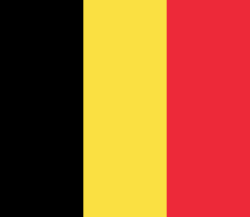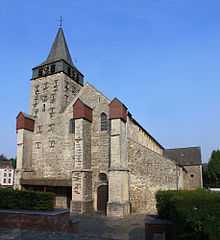Religion in Belgium
Religion in Belgium (Eurobarometer 2012)[1]
| Part of a series on the |
| Culture of Belgium |
|---|
 |
| History |
| People |
| Languages |
| Cuisine |
| Festivals |
| Religion |
| Art |
| Literature |
|
Music and performing arts |
|
Media |
| Sport |
|
Monuments |
|
Symbols |
|
Christianity, in particular Catholicism, is the largest religion in Belgium with about 57% of the population adhering to the Catholic Church, 1.7% to Protestantism, and 0.3% to Orthodox Christian Churches in the 2000s.[2] Belgium has a separation between the Church and State, and freedom of religion. Consequently, the State cannot force someone to adhere to a certain religion nor can it ask someone to which he or she adheres. The second largest religion is Islam with 6% of the resident population being Muslim (3.9% in Flanders, 4% in Wallonia, 25.5% in Brussels),[3] or even 8.1% as of 2011 (considering all the immigrant people with Islamic background).[4] A 2006 inquiry in Flanders showed 55% of its inhabitants calling themselves religious, while 36% claimed belief that God created the world.[5]
A 2011 survey by Ipsos MORI reckoned 49% of the population as adhering to Christianity, 6% to Islam, 4% to unspecified other religions, 2% to Buddhism, 31% as non religious, while 8% of the population did not give an answer to the question.[6]
Christianity
Roman Catholicism


Roman Catholicism has traditionally been Belgium's majority religion; being especially strong in Flanders. However, by 2009 Sunday church attendance was 5.4% in Flanders compared to 12.7% in 1998.[7] For the total of Belgium, Sunday church attendance was 5% in 2009 and 11.2% for the total of Belgium in 1998[8] Despite a 6% drop in Sunday church attendance from 11 to 5% in 9 years, Catholicism nevertheless remains an important force in Belgian society.
Until 1998, the Roman Catholic Church annually published key figures such as Sunday mass attendance and the number of baptized children. (Refer to the table for an overview 1967 - 2009.) In 2006, the church published the mass attendance figure for the Christmas period being 11.5%, and 7% average weekly (note not only Sunday) mass attendance[9] for the Flanders region. Since 2000, Sunday church attendance in Flanders drops by 0.5% on a yearly basis whereas this rate of decrease was previously 1%.[10]
Anglicanism
Belgium has a small number of Anglican Communion churches which are part of the Diocese in Europe including the Pro-Cathedral of the Holy Trinity, Brussels.
Other religions
The second largest religion practiced in Belgium is Islam (6%). There are also small minorities of Protestants, Orthodox and Jews. Belgian law officially recognizes those denominations, as well as the secular organizations (Dutch: vrijzinnige levensbeschouwelijke organisaties, French: organisations laïques). Buddhism is in the process of being recognized under the secular organization standard. Official recognition means that priests (called "counsellors" within the secular organizations) receive a state stipend, and that parents can choose any recognized denomination to provide religious education to their children if they attend a state school.[11]
After attaining autonomy from the federal state level in religious matters, the Flemish Parliament voted a new Flemish regional decree on recognized religious denominations, installing democratically elected church councils for all recognized religious denominations and made them subject to the same administrative rules as local government bodies - with important repercussions as far as financial accounting and open government are concerned. In 2006, however, the Catholic bishops still appointed candidates to the Catholic Church councils because they had not decided on the criteria for eligibility. That is, they were afraid that Catholic candidates who might get elected would be merely baptized Catholics. By 2008, however, the bishops decided that candidates for the election of the church councils had only to prove that they were over 18, a member of the parish church serving the town or village in which they were residents, and that they were baptized Catholic. Thus normal elections took place.[12]
Jainism, Hinduism and Sikhism also have growing numbers of adherents in Belgium, but are not recognized by the government. This does not deny them the right to practice their religion, merely the right to have government-style elections and regulations on them.
According to the most recent Eurobarometer Poll 2010,[1]
- 37% of Belgian citizens responded that they believe there is a God.
- 31% answered that they believe there is some sort of spirit or life-force.
- 27% answered that they do not believe there is any sort of spirit, God, or life-force.
The precise figures are in dispute, however, among some committed people, as it is unclear how many Belgians who say they believe in a God can still be called Christians and how many who call themselves "Christian," but refuse the label "Catholic," have severed all links to the Roman Catholic Church. Possibly Catholic pastors keep records of this, but they are unknown. Also in dispute are how many Catholic Belgians have become deists or have joined one of the several small Protestant churches. Again, it would be up to the respective churches to determine this data.
| Catholics in Belgium | ||||||||||
| year | Sunday Mass Attendance [13] (%) | baptism (%) | ||||||||
|---|---|---|---|---|---|---|---|---|---|---|
| 1967 | 42.9% | 93.6% | ||||||||
| 1973 | 32.3% | 89.3% | ||||||||
| 1980 | 26.7% | 82.4% | ||||||||
| 1985 | 22.0% | - | ||||||||
| 1990 | 17.9% | 75.0% | ||||||||
| 1995 | 13.1% | - | ||||||||
| 1998 | 11.2% | 64.7% | ||||||||
| 2006 | 7% (Flanders only)[9] | 56.8% | ||||||||
| 2009 | 5% [8] | |||||||||
History
.svg.png)
After the Roman period Christianity was brought back to the southern Low Countries by missionary saints like Willibrord and Amandus. In the 7th century abbeys were founded in remote places, and mainly from there the christianization process was started. This was very much under the auspices of the Merovingian dynasty, and later by Charlemagne, who even waged war to impose the new religion.
The Reformation Era was particularly influential in the confluence of currents which formed modern Belgium. Belgium became in 1523 the site of the first martyrdom of Lutherans by the Roman Catholic Church as Augustinian monks Johann Esch and Heinrich Voes were burned at the stake in Brussels for their conversion to Lutheran doctrine. Before the end of the century, however, Belgium was part of the Spanish empire which showed as little tolerance for complacent or liberal Catholics as for Protestants. One of the effects was that Catholics fearing the Inquisition and preferring to live with Protestants who would at least tolerate them migrated in large numbers to the Dutch Republic. After the Spanish military conquest of 1592, and until the re-establishment of religious freedom in 1781 by the Patent of Toleration under Joseph II of Austria, Roman Catholicism was the only religion allowed (on penalty of death) in the territories now forming Belgium. However, a small number of Protestant groups managed to survive, at Maria-Horebeke, Dour, Tournai, Eupen and Hodimont.[14]
Religion was one of the differences between the almost solidly Roman Catholic south and the predominantly Protestant north of the United Kingdom of the Netherlands, formed in 1815. The union broke up in 1830 when the south seceded to form the Kingdom of Belgium. Roman Catholicism in Belgium's first century was socially such a binding factor that it prevailed over the important difference in languages (Dutch versus French). The loss in importance of religion as a social marker across late 20th century Western Europe, explains to a large extent the current centrifugal forces in Belgium, with language differences (increasingly reinforced by a positive feedback effect on the media) no longer being kept in check by a religious binding factor. If anything, the Catholic Church has acquiesced to these changes by having a Dutch-speaking university (Katholieke Universiteit Leuven) and a French-speaking university (Universite Catholique de Louvain).
Until the late 20th century, Roman Catholicism played an important role in Belgian politics. One significant example of this are the so-called "Schools' wars" (Dutch: schoolstrijd, French: guerres scolaires) between the philosophically left-wing parties (Liberals first, Liberals and Socialists later) and the Catholic (later Christian Democrat) party, which took place between 1879 and 1884 and later between 1954 and 1958. Another important controversy happened in 1990 when the very religious Catholic monarch, King Baudouin I, refused to officially ratify with his signature an abortion bill that had already been approved by parliament. The king then asked Prime Minister Wilfried Martens and his government to find a solution, which proved novel. The government declared King Baudouin unfit to fulfill his constitutional duties as monarch for one day, while Government ministers signed the bill in his place,[15] and then proceeded to reinstate the king after the abortion law had come into effect.
In 2002, the then officially recognized Protestant denomination, the United Protestant Church of Belgium,[16] itself the result of mergers in 1839, 1969 and 1979 [17] (consisting of around 100 member churches, usually with a Calvinist or Methodist past) and the until then unsubsidized Federal Synod of Protestant and Evangelical churches (600 member churches in 2008, but still not including all evangelical and charismatic groups outside the Catholic tradition) together formed the Administrative Council of the Protestant and Evangelical Religion (ARPEE in Dutch, CACPE in French), which is now the accepted mouthpiece of Protestantism in all three linguistic communities. Based on a 2001 survey conducted by evangelical sources, charismatic and evangelical associations claim a membership of 4% of the Belgian population (a modest percentage of the total population but allegedly a half percentage point more than that of the current Muslim population, as tallied by non-religious sources).[18]
Freedom of religion
The Constitution provides for freedom of religion, and the Government generally respected this right in practice. However, government officials continued to have the authority to research and monitor religious groups that are not officially recognized. There were a few reports of societal abuses or discrimination based on religious belief or practice. Some reports of discrimination against minority religious groups surfaced as well.
See also
- Basilica of the Sacred Heart in Koekelberg
- Buddhism in Belgium
- Hinduism in Belgium
- History of Dutch religion
- History of the Jews in Belgium
- Holy Corner, a small Ghent ecumenic neighbourhood with four officially recognized churches
- Islam in Belgium
- Irreligion in Belgium
- Jainism in Belgium
- Roman Catholicism in Belgium
- Scientology in Belgium
- Sikhism in Belgium
References
- ↑ 1.0 1.1 Discrimination in the European Union in 2012 p. 233,234.
- ↑ Wereldreligies (in België). Retrieved 26-09-2012.
- ↑ "In België wonen 628.751 moslims(*), 6,0% van de bevolking. In Brussel is dit 25,5%, in Wallonië 4,0%, in Vlaanderen 3,9% BuG 100 - Bericht uit het Gewisse - 11-09-2008". Npdata.be. (*)Berekend aantal - indicatief cijfer, zie methodologie hieronder
- ↑ "Vreemde afkomst 01/01/2012". Npdata.be. Retrieved 2012-06-08.
- ↑ Inquiry by 'Vepec', 'Vereniging voor Promotie en Communicatie' (Organisation for Promotion and Communication), published in Knack magazine 22 November 2006 p.14 (The Dutch language term 'gelovig' was translated in the text as 'religious', more precisely it is a very common word for believing in particular in any kind of god in a monotheistic sense, and/or in some afterlife.
- ↑ Views on globalisation and faith. Ipsos MORI, 5 July 2011.
- ↑ "Kerken lopen zeer geleidelijk helemaal leeg - De Standaard". Standaard.be. 2010-11-25. Retrieved 2014-03-18.
- ↑ 8.0 8.1 "Met uitsterven bedreigd: de Brusselse kerkganger | Brusselnieuws" (in Dutch). Brusselnieuws.be. 2010-11-30. Retrieved 2014-03-18.
- ↑ 9.0 9.1 Auteur: Veerle Beel. "7 procent nog wekelijks naar de mis - Het Nieuwsblad". Nieuwsblad.be. Retrieved 2014-03-18.
- ↑ "Kerkpraktijk In Vlaanderen Figure 1 page 121" (PDF) (in Dutch). Soc.kuleuven.be.
- ↑ "Pedagogical Centre of the Orthodox Church in Belgium, which trains religious education teachers for state and local council schools". Retrieved 2008-04-10.
- ↑ Kerkfabriek van Geel-het Punt. "History of the Catholic Geel Church Council since 2005 (in Dutch)". Retrieved 2008-04-10.
- ↑ "Kerkpraktijk In Vlaanderen Table 1 page 115 PDF document in Dutch" (PDF). Soc.kuleuven.be. Retrieved 2014-03-18.
- ↑ Frank Rooze (inspector of protestant religious education). ""De Reformatie in vogelvlucht" or how Flemish protestantism retreated to the North (in Dutch)". Retrieved 2008-04-10.
- ↑ Montgomery, Paul L. (April 5, 1990). "Belgian King, Unable to Sign Abortion Law, Takes Day Off". New York Times. Retrieved 2008-04-10.
- ↑ UPCB. "Website of the United Protestant Church of Belgium (in Dutch)". Retrieved 2008-04-10.
- ↑ ARPEE/CACPE. "Preface to the CACPE bylaws, with the history of Protestantism in Belgium". Retrieved 2008-04-10.
- ↑ WEC. "An evangelical view of the religious situation in Belgium (in Dutch)". Archived from the original on 2007-11-13. Retrieved 2008-04-10.
External links
| Wikimedia Commons has media related to Religion in Belgium. |
- Searchportal "Catholicism in Belgium"
- Eurel: sociological and legal data on religions in Europe
- Kerknet.be : Website of the Roman Catholic Church in Flanders (in Dutch)
- Catho.be : Website of the Roman Catholic Church in French-speaking Belgium (in French)
- Website of one of the German-speaking Roman Catholic parishes
- Website of ARPEE/CACPE, which unites UPCB and the Federal Synod (French and Dutch Protestant/Evangelical)
- Orthodox Church in Belgium (Dutch, French and Greek)
- Web page with the addresses of the Anglican church in Belgium
- Website of the Muslim Executive Council in Belgium (in French and Dutch, some English)
- Website of the Central Jewish Consistoire in Belgium (in French, no English as of 2008-04-10)
- Buddhist union of Belgium website (in Dutch and French)
- Namaskar - Hindu Association of Brussels, Belgium
| ||||||||||||||||||


